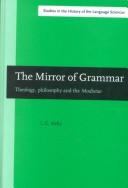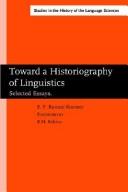| Listing 1 - 2 of 2 |
Sort by
|

ISBN: 9027245908 1588111768 9786612254864 9780585462526 9027297304 0585462526 1282254863 9780585462523 9789027245908 9781588111760 9789027297303 9781282254862 6612254866 Year: 2002 Volume: 101 Publisher: Amsterdam Philadelphia J. Benjamins Pub. Co.
Abstract | Keywords | Export | Availability | Bookmark
 Loading...
Loading...Choose an application
- Reference Manager
- EndNote
- RefWorks (Direct export to RefWorks)
Much is known about the grammar of the modistae and about its eclipse; this book sets out to trace its rise. In the late eleventh century grammar became an analytical rather than an exegetical discipline under the impetus of the new theology. Under the impetus of Arab learning the ancient sciences were reshaped according to the norms of Aristotle's Analytics, and developed within a structure of speculative sciences beginning with grammar and culminating in theology. Though the modistae acknowledge Aristotle, Donatus, Priscian and the Arab commentators, their roots also lie in Augustine and Boethius, and they took as much from their scholastic contemporaries as they gave them. This book traces the genesis of a grammar which communicated freely with other speculative sciences, shared their structures and methods, and affirmed its own individuality by defining its object as the causes of language.
Speculative grammar. --- Speculative grammar --- Grammaire spéculative --- Modistic grammar --- Grammar, Comparative and general --- Latin language, Medieval and modern --- Scholasticism --- Grammar

ISBN: 1283314487 9786613314482 9027281416 9789027281418 9027208913 9027209561 9789027245106 9781283314480 661331448X 902724510X Year: 1977 Publisher: Amsterdam J. Benjamins
Abstract | Keywords | Export | Availability | Bookmark
 Loading...
Loading...Choose an application
- Reference Manager
- EndNote
- RefWorks (Direct export to RefWorks)
This book provides a critical edition, translation and commentary of the British Museum Incunabulum C.21.C.52 and the Cambridge Incunabulum 5.J.3.7. of the Quaestiones Alberti. Although the British Museum catalogue ascribes the incunabulum to Albertus Magnus, the authorship is debated.The format of the twenty-one questions of this text follows the standard pattern of the time: after stating the question, the author cites as argumenta opinions with which he does not agree, gives his own answer, and then refutes the argumenta.For the author of these questions, three is
Speculative grammar. --- Modistic grammar --- Grammar, Comparative and general --- Latin language, Medieval and modern --- Scholasticism --- Grammar
| Listing 1 - 2 of 2 |
Sort by
|

 Search
Search Feedback
Feedback About UniCat
About UniCat  Help
Help News
News